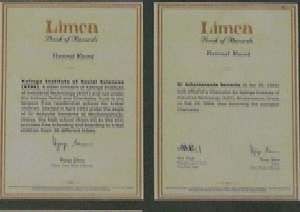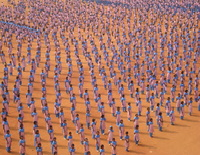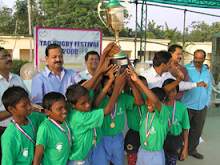Indigenous communities of India are commonly referred to as tribal or
adivasi communities and are recognised as Scheduled Tribes under the Constitution of India. Although the Constitution does not define Scheduled Tribes as such, it designates these communities as those which are scheduled in accordance with Article 342 of the Constitution.
The criteria followed for specification of a community, as scheduled tribe are
indications of primitive traits, distinctive culture, geographical isolation, shyness of contact with the community at large, and backwardness. At present, 533 tribes in India have been notified under Article 342 of the Constitution with the largest number of
62 tribes belonging to the State of Odisha.
Socio-Economic and Demographic Profile:
As per the 1991 Census, the Scheduled Tribes (ST) account for 67.76 million representing 8.08 percent of the country’s population. Of this, 1.32 million (1.95%) belong to Primitive Tribal Groups (PTG) who are more marginalised than the ST population. The ST population is estimated to have reached
88.8 million in 2001 which is 8.6% of the country’s total population in 2001. The Scheduled Tribes are spread across the country and reside mainly in forest and hilly regions.
The proportion of Scheduled Tribes within general population varies across States/ Union Territories and indicates heavy concentration in certain parts such as Mizoram (94.7%), Lakshwadeep (93.2%), Meghalaya (85.5%), Dadra and Nagar Haveli (78.9%). States of Kerala (1.1%), Tamil Nadu (1%) and Uttar Pradesh (0.2%) have a low percentage of Scheduled Tribe population in comparison to the general population.
Since Independence, the percentage of ST population has steadily increased following the growth in general population. It is also important to note that
a large majority of tribals in India are landless and do not have a sustainable source of livelihood. The 1991 Census figures reveal that 42.02 percent of the Scheduled Tribe population were main workers (those who were employed for more than 183 days in the preceding year) of whom 54.50 percent were cultivators and 32.69 percent agricultural labourers.

Thus, about
87 percent of the main workers from these communities were engaged in primary sector activities. While a majority of those employed do not receive even the statutory minimum wages,
tribal women are found to be doubly exploited since they are paid even less than the tribal men.
Tryst With Poverty:
It is thus not surprising that poverty is widely prevalent among tribal population in India. Even when the overall levels of poverty for tribal population have reduced between 1993-94 to 1999-2000 from 51.94% to 45.86% among the rural tribal population and 41.14% to 34.75% among the urban tribal population, two important trends can be observed. Firstly, the rate of decline in poverty among the STs is much lower than that among the general population and secondly,
the gap between poverty rates among tribal and general population is widening.
Dwindling Sex Ratio:
The sex ratio among the STs, although significantly higher than the general population, has been slowly declining. While there were
982 tribal females for every 1000 tribal males in 1971, the 1991 Census shows that there are only
972 females for every 1000 tribal males. This could be indicative of their
poor access to health services.
Educational Status of Tribals in India:
Tribal children, like several marginalised groups of children in India, are trapped in an intergenerational vicious cycle of
poverty, illiteracy and deprivation. This is evident in extremely poor adult literacy rates which are reproduced as low education levels among the children from ST communities.
The literacy rate of Scheduled Tribes is abysmally low at around 29.60 percent, as against the national average of 52.21 percent. A review of literacy rates among ST population in comparison with that of the general population indicates a growing gap between literacy rates of these two communities.
About the Tribes of Odisha:
(source: www.kalingatimes.com)
Orissa has a large variety of tribal communities dispersed at various locations of the state, At one extreme are the groups which lead a relatively secluded and archaic mode of life, keeping their core culture intact, while at the other extreme there are communities which are indistinguishable from the general agricultural communities.
The tribal people express their cultural identity and distinctiveness in their social organization, language, rituals and festivals and also in their dress, ornaments, art and craft.
In India there is an amalgam of 437 tribes, and in Orissa the number is 62. According to 2001 Census, in Orissa the total strength of tribal population is approximately eight million which constitutes 22.13% of the total population of the State.
Linguistically the tribes of India are mainly classified into four categories, namely (1) Indo-Aryan speakers, (2) Dravidian speakers, (3) Tibeto-Burmese speakers. The Indo-Aryan language family in Orissa includes
Dhelki-Oriya, Matia, Haleba, Jharia, Saunti, Laria and Oriya (spoken by Bathudi and the acculturated sections of Bhuyans, Juang, Kondh, Savara, Raj Gond etc.).
The Austric language family includes eighteen tribal languages namely,
Birija, Parenga, Kisan, Bhumiji, Koda, Mahili Bhumiji, Mirdha-Kharia, Ollar Gadaba, Juang, Bondo, Didayee, Karmali, Kharia, Munda, Ho, Mundari and Savara. And within the Dravidian language family there are nine languages in Orissa, namely,
Pengo, Gondi, Kisan, Konda, Koya. Parji, Kui, Kuvi and Kurukh or Oraon.
 Mr. Timothy J. Roemer, His Excellency the U.S. Ambassador to India visited KISS on 7th April 2010 to inaugurate the English Access Microscholorship Programme at KISS. Students had made a human chain to signify that people should be tied in a strong bond of love and affection. It was the, visit of an American Ambassador to Orissa after 12 years. Mr. Roemer also unveiled a golden plaque in the honour of his visit to KISS .
Mr. Timothy J. Roemer, His Excellency the U.S. Ambassador to India visited KISS on 7th April 2010 to inaugurate the English Access Microscholorship Programme at KISS. Students had made a human chain to signify that people should be tied in a strong bond of love and affection. It was the, visit of an American Ambassador to Orissa after 12 years. Mr. Roemer also unveiled a golden plaque in the honour of his visit to KISS . 













 the pursuit of knowledge and well being of the people in the society at large.
the pursuit of knowledge and well being of the people in the society at large.


































